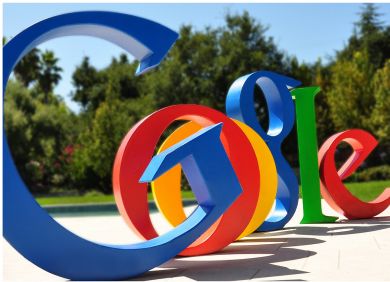Google Reveals Stock Split As Sales Rise 24 Percent

Revenue at Google rose 24 percent in the first quarter as the search engine giant revealed a stock split
Google has reported that first quarter revenues have risen 24 percent year on year, to $10.65 billion (£6.68bn) on the back of “tremendous momentum” from its product portfolio including Android, the Chrome browser, and YouTube.
It additionally announced a 2-for-1 stock split that will give a new class of non-voting capital stock to shareholders.
Keeping Control
Investors, pointing to what Google revealed was a $49.3 billion (£30.9bn) cash pile as of 31 March, had been asking Google to issue a dividend – what it did instead is designed to better keep the company’s co-founders, Page and Sergey Brin, in control of “Google’s destiny” over the long term.
 In a 2012 Founders’ Letter, Page wrote that when the company went public in 2004, a dual-class voting structure was established. “Our goal was to maintain the freedom to focus on the long term by ensuring that the management team, in particular [executive chairman Eric Schmidt], Sergey and I, retained control over Google’s destiny,” wrote Page.
In a 2012 Founders’ Letter, Page wrote that when the company went public in 2004, a dual-class voting structure was established. “Our goal was to maintain the freedom to focus on the long term by ensuring that the management team, in particular [executive chairman Eric Schmidt], Sergey and I, retained control over Google’s destiny,” wrote Page.
Explaining further, he quoted from Google’s first founders’ letter, in which they had written, “We want Google to become an important and significant institution. That takes time, stability and independence.”
In discussing the details of the first quarter, Page again emphasised the need for patience and a long-term view. Android, he explained, took Google three years to develop and another three years to reach a critical mass. Such projects, he said, “are not for the faint-hearted.”
Page returned to this theme again later, explaining that the public wasn’t privy to those six years that Google devoted to Android immense amounts of time and energy, both finite and valuable resources. “It’s an important discipline for a company to have,” he said.
The comment came in response to a question regarding projects that fit what Page has previously called a “healthy disregard for the impossible.” Google has said it divvies up its money 70, 20, 10 – 70 percent on the mainstream investments, 20 percent on more near-term endeavours and 10 percent on the “Who knows?” projects.
“In our history we’ve even struggled to give 10 percent to the speculative things,” Page admitted, surely to the relief of more conservative investors. There are a limited number of things that can get done, so Google wants to make sure it has the right mix of products.
Unified Experience
That very much includes Android, Page said, when asked about its benefit to Google. He emphasised its ability to offer users a great experience, which is critical to a central Google goal of offering a very integrated experience across devices.
“I think people are going to get a lot more devices. Each one is a hassle, and you think about the issues with it. [In the future] I think you’re going to have a pretty unified experience and a great experience,” said Page. “You’re not going to have to think about it so much.”
Page added that Google is very excited about tablets and expects, in the more near term, lower-end models running a limited version of Android to have a good amount of success, believing, “it’s an important area.”
“We are still at the very early stages of what technology can do to improve people’s lives and we have enormous opportunities ahead, Page said in a statement and loosely repeated in his prepared remarks. “It is a very exciting time to be at Google.”
Do you know Google’s secrets? To find out, take our quiz.